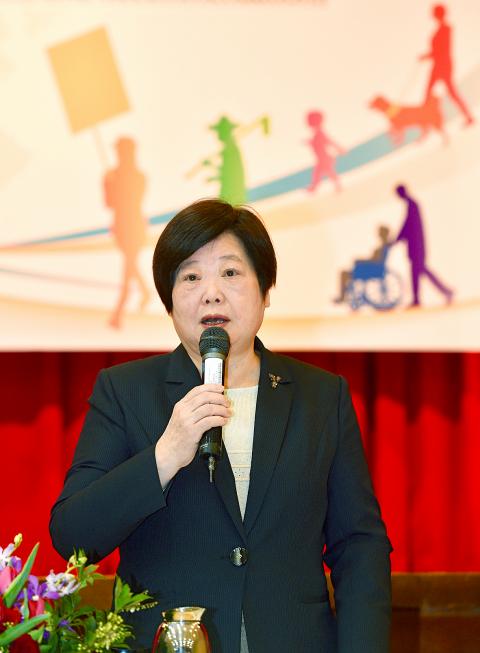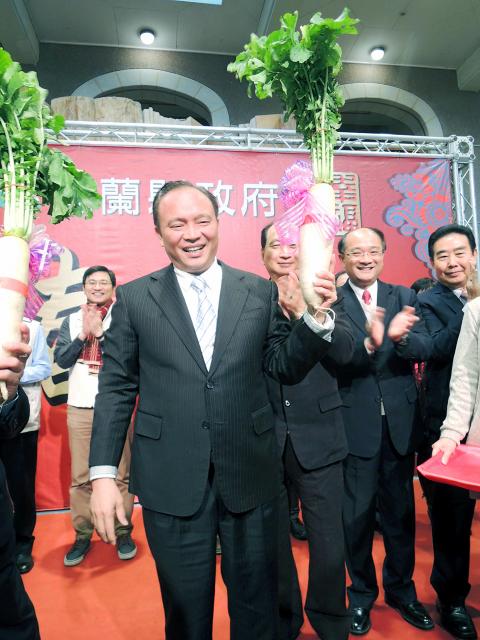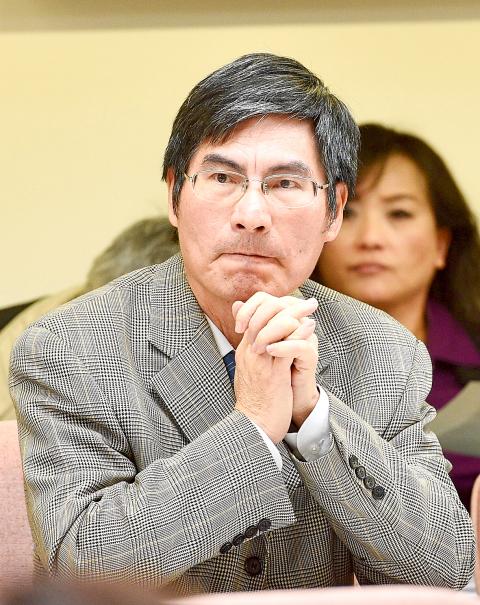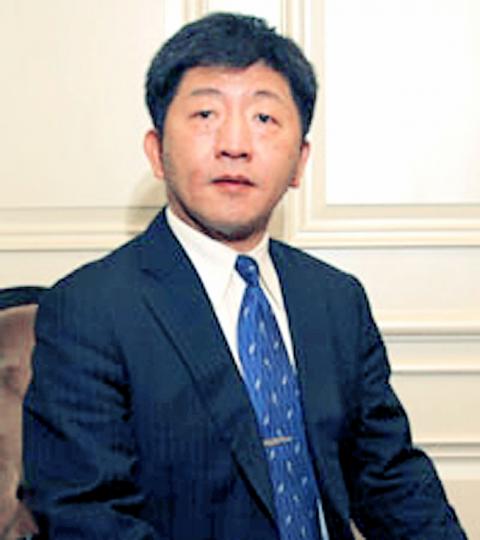The Executive Yuan yesterday announced a Cabinet reshuffle, appointing four ministers and confirming rumors circulating ahead of the Lunar New Year holiday that the government was considering a reshuffle to improve policy implementation.
Deputy Minister of Education Chen Liang-gee (陳良基) has been appointed minister of science and technology; former deputy minister of health Chen Shih-chung (陳時中) has been tapped to head the Ministry of Health and Welfare; Yilan County Commissioner Lin Tsung-hsien (林聰賢) has been appointed council of agriculture minister; and Minister Without Portfolio Lin Mei-chu (林美珠), who is also President Tsai Ing-wen’s (蔡英文) cousin, has been appointed minister of labor.
Lin Mei-chu’s specialty in law will be a boon for the government following amendments to the Labor Standards Act (勞動基準法), Executive Yuan spokesperson Hsu Kuo-yung (徐國勇) said.

Photo: Peter Lo, Taipei Times
Lin Mei-chu is expected to shoulder the responsibility of communicating with the public on the controversial amendments, the Executive Yuan said, adding that she would be retaining her position as minister without portfolio.
Lin Tsung-hsien, 55, comes from a family of farmers and studied at then-National Chiayi Institute of Agriculture, now National Chiayi University, the Executive Yuan said, adding that with such a background, the government hopes Lin Tsung-hsien will be suited to promote the government’s agricultural policies.
Chen Shih-chung promised that the policy of including doctors under the Labor Standards Act would not be changed, saying that “medical services are a part of the service sector.”

Photo: Chiang Chih-hsiung, Taipei Times
He cited drafting the white paper for the Tsai administration’s medical policies as his qualifications for accepting the position.
Regarding a controversy over the government’s plan to lift a ban on food imports from five Japanese prefectures, Chen Shih-chung said Taiwan must connect with the world and should base its decisions on facts.
He rejected the notion that ministers without portfolios have greater power than ministers, saying that the former are tasked with policy instruction, while the latter focus on implementation.

Photo: Peter Lo, Taipei Times
Meanwhile, Chinese Nationalist Party (KMT) caucus deputy secretary-general Lin Wei-chou (林為洲) said the party would not comment on the appointments until it observes the new ministers.
Implementing reform is not a 100m dash and the Cabinet should focus on communication and building consensus, he said.
Taoyuan Confederation of Trade Unions chairman Mao Chen-fei (毛振飛) said he did not have high expectations for Lin Mei-chu because of her specialty in law.

Screengrab from Taipei Medical University’s Web site
Lin Mei-chu is a foreign name to the labor sector, Mao said, adding that from his experience law experts are cold and rigid.
“Law is not everything,” Mao said, citing the example of former minister of labor Jennifer Wang (王如玄), also a legal expert, who filed a lawsuit against workers protesting the closure of the factory they worked at.
Additional reporting by Cheng Hung-ta and CNA

US President Donald Trump yesterday announced sweeping "reciprocal tariffs" on US trading partners, including a 32 percent tax on goods from Taiwan that is set to take effect on Wednesday. At a Rose Garden event, Trump declared a 10 percent baseline tax on imports from all countries, with the White House saying it would take effect on Saturday. Countries with larger trade surpluses with the US would face higher duties beginning on Wednesday, including Taiwan (32 percent), China (34 percent), Japan (24 percent), South Korea (25 percent), Vietnam (46 percent) and Thailand (36 percent). Canada and Mexico, the two largest US trading

ACTION PLAN: Taiwan would expand procurement from the US and encourage more companies to invest in the US to deepen bilateral cooperation, Lai said The government would not impose reciprocal tariffs in retaliation against US levies, President William Lai (賴清德) said yesterday, as he announced five strategies to address the issue, including pledging to increase Taiwanese companies’ investments in the US. Lai has in the past few days met with administrative and national security officials, as well as representatives from various industries, to explore countermeasures after US President Donald Trump on Wednesday last week announced a 32 percent duty on Taiwanese imports. In a video released yesterday evening, Lai said that Taiwan would not retaliate against the US with higher tariffs and Taiwanese companies’ commitments to

‘SPECIAL CHANNEL’: Taipei’s most important tasks are to stabilize industries affected by Trump’s trade tariffs and keep negotiations with Washington open, a source said National Security Council Secretary-General Joseph Wu (吳釗燮) arrived in the US for talks with US President Donald Trump’s administration, a source familiar with the matter said on Friday. Wu was leading a delegation for a meeting known as the “special channel,” the Financial Times reported earlier. It marked Trump’s first use of the channel since returning to the White House on Jan. 20. Citing a source familiar with the matter, the Financial Times reported that Minister of Foreign Affairs Lin Chia-lung (林佳龍) was also a part of the delegation. The visit came days after China concluded war games around Taiwan and amid Trump’s

CHIP EXCEPTION: An official said that an exception for Taiwanese semiconductors would have a limited effect, as most are packaged in third nations before being sold The Executive Yuan yesterday decried US President Donald Trump’s 32 percent tariff on Taiwanese goods announced hours earlier as “unfair,” saying it would lodge a representation with Washington. The Cabinet in a statement described the pledged US tariffs, expected to take effect on Wednesday next week, as “deeply unreasonable” and “highly regrettable.” Cabinet spokeswoman Michelle Lee (李慧芝) said that the government would “lodge a solemn representation” with the US Trade Representative and continue negotiating with Washington to “ensure the interests of our nation and industries.” Trump at a news conference in Washington on Wednesday announced a 10 percent baseline tariff on most goods